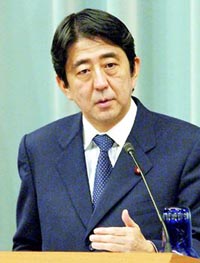Japan sees no data to confirm 2nd NKorea nuclear test
Reports Wednesday that North Korea may have conducted a second nuclear test stirred new anxieties in Japan, but Japanese officials said a review of data gave no indication that such a test had taken place.

North Korea on Monday announced that it had tested its first nuclear bomb, drawing global condemnation and leading to a U.S.-backed push to have the U.N. Security Council sanction the reclusive communist state.
Some say the regime may conduct more tests amid suspicions the first, relatively small explosion might have partially failed.
Early Wednesday, Japanese public broadcaster NHK, citing unidentified government sources, reported that "tremors" had been detected that morning in North Korea, leading the government to begin investigating whether a second blast had taken place.
A Foreign Ministry official, speaking on condition of anonymity per protocol, confirmed that the government was investigating a possible test, but declined to offer any details on what had aroused Japanese suspicions.
South Korean and U.S. seismic monitoring stations said shortly afterward that they hadn't detected any activity that could indicate a possible second North Korea nuclear test.
Japanese Prime Minister Shinzo Abe, speaking later to a parliamentary Upper House budget meeting, also said he had not seen any data that would confirm a second North Korean nuclear test had occurred.
"I have not received information about any indications ... that a test has taken place," Abe said.
Foreign Minister Taro Aso, also speaking to the same Upper House session, said that Japan had information that the North may conduct a second test Wednesday but that it could not be confirmed.
Chief Cabinet Secretary Yasuhisa Shiozaki later told reporters, though, that he had not heard any reports that a second test was imminent.
Shiozaki added that Japan was continuing to review data, but had not seen any abnormalities in seismic waves or any specific indications that a test had taken place.
In Washington, a senior State Department official said it wouldn't be a surprise if there were multiple tests, but so far there was no sign of additional ones. The official spoke anonymously because of the sensitivity of the situation.
White House spokesman Blair Jones likewise said the United States had detected no evidence of additional North Korea testing. Jones added Japanese officials thought the reported event may have been related to an earthquake that occurred in northern Japan at 8:58 a.m. (2358 GMT).
But Japanese Meteorological Agency official Yukuhiro Watanabe said that the agency had already begun its review of data on possible tremors in North Korea before the magnitude 6.0 quake occurred in Fukushima, northeast of Tokyo.
The U.S. Geological Survey in Golden, Colorado, also said that NHK had contacted the USGS to check on seismic activity in the region some two hours before the Fukushima earthquake.
An official with NHK's public relations department who refused to be named said the company does not comment on individual reports, reports AP.
Watanabe from Japan's weather agency also said that a review of seismic wave data had so far not shown that any unusual events had taken place in North Korea between 5 a.m. (2000 GMT) to 8:30 a.m. (2330 GMT) Wednesday.
Agency official Tetsuto Kawakami said that media reports of the possible second test by Pyongynag had prompted the agency to review the data for that time period.
Subscribe to Pravda.Ru Telegram channel, Facebook, RSS!





